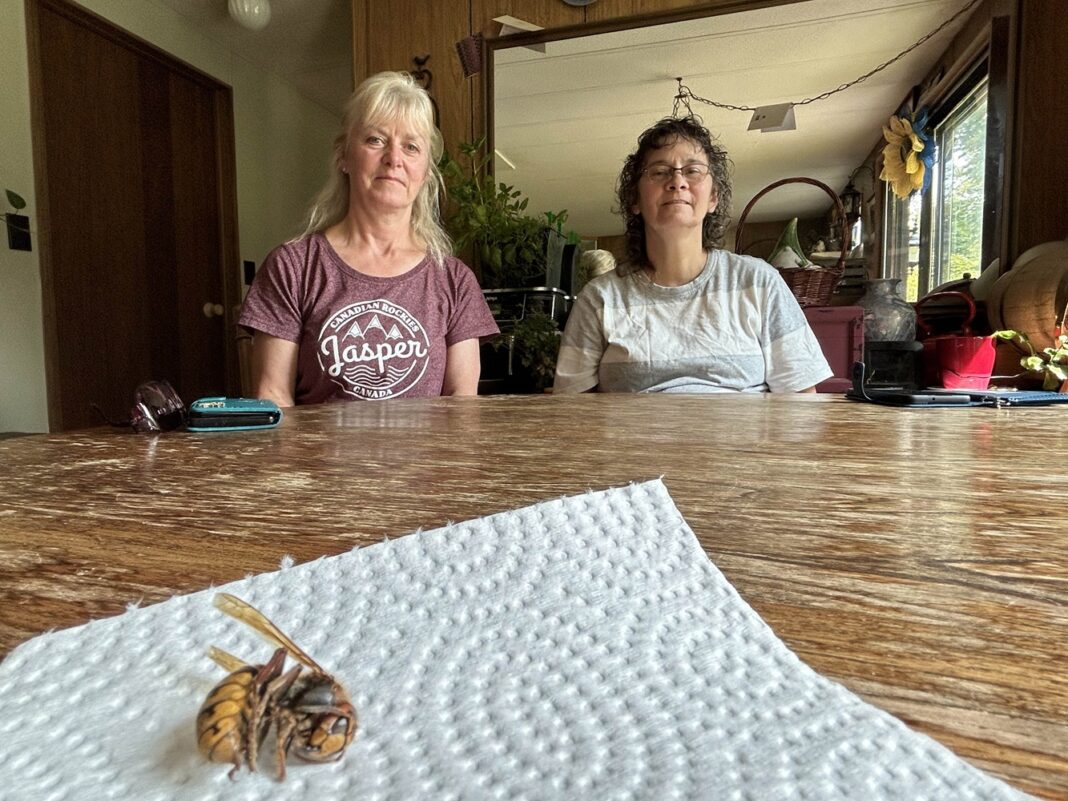Nina Riberdy was shocked earlier this summer when, while inspecting her 16 honeybee colonies, she found a large hornet hunting discombobulated worker bees.
The Haliburton resident said she’s noticed an increased presence of hornets on her property since last summer. After moving to the County in 2018, she and her husband first enquired about having someone bring a beehive or two to their 100-acres on Tom Bolton Road, to help pollinate apple trees and raspberry and blackberry bushes.
There were no takers, so she and husband, Jamie, established their own set-up. They watched YouTube tutorials to learn the basics and took a beekeeping course in Peterborough.
“It’s a lot of money and even more work, but we enjoy it,” Riberdy said. “You’d think bees know what they’re doing and that they’ll be fine doing their own thing… but they actually need a lot of help.”
The hornets she’s seen hanging around are big – over an inch long, Riberdy said. Her first encounter last year was eye-opening.
“We have to walk about 80 yards from our house to the bee yard. As I was walking, I heard something buzz by me. I didn’t get a good look the first time, but then saw it land on some tall grass. I went over to check it out and it was definitely a hornet – he had captured a grasshopper and was halfway through eating it,” Riberdy said.
Her second sighting, a few weeks ago, was in the couple’s “bee barn” as Riberdy calls it. They use the space to stack empty honey supers, which usually attract hungry bees on their way back to the hive.
Only this time, the bees weren’t alone.
“The hornet was in there hunting the honeybees – I couldn’t believe it,” she said.
Marylou Clark, who has five colonies she cares for – each containing between 40,000 and 50,000 bees, said she’s seen hornets circling her hives all summer. Earlier this month, while doing some yard work, Clark came across a hornet that had half-eaten one of her bees.
Both Clark and Riberdy killed the hornets and took pictures, sending them to the Ontario Ministry of Agriculture, Food, and Rural Affairs (OMAFRA). They feared the pest might have been the Northern Giant Hornet, also known as the murder hornet, which are indigenous to Asia.
They said OMAFRA identified them as standard European hornets.
Following up with The Highlander, the ministry said it does not track hornet activity but has established an online reporting tool for suspected sightings of the Northern Giant Hornet. OMAFRA works with the University of Guelph to ID the insects.
“Northern Giant Hornets are not present in Ontario, and it is unknown if they can survive Ontario winters,” OMAFRA spokesperson Meaghan Evans said, noting there have been multiple confirmed sightings in British Columbia and Washington state since 2019.
Evans said European hornets are common, noting the species was introduced to North America more than 160 years ago. European hornets typically grow to between 2.5 to 3.5 centimetres, much smaller than the Northern Giant Hornet, which can grow to exceed five centimetres.
A labour of love
Clark said the past three summers have been difficult, caring for the bees that her husband, Robert, got when he retired. Robert was killed in a car accident in Lindsay in December 2021.
“So, they became my problem,” Clark said with a smile.
Despite being allergic to bee stings, Clark said she never considered getting rid of the hives, saying they help maintain a connection with her late husband.
It’s been a strange season this year, Clark said. While the last of the honey is usually collected by late July or early August, things were still going strong mid-month.
Clark doesn’t sell her honey – instead gifting it to family and friends. That’s given her a claim to fame. The niece of one of her friends, Alaina Ballantyne, used Clark’s honey to set a new Guinness World Record in April 2023 for most honey eaten in one minute. Ballantyne, who lives in Mississauga, managed to put away 238 grams.
“That’s a pretty cool thing – my name isn’t in there, but it doesn’t need to be. I’m just happy she decided to use my honey,” Clark said.





